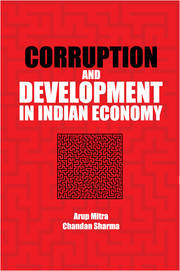Book contents
- Frontmatter
- Contents
- List of Tables and Figures
- Preface
- 1 Issues in Corruption: Theoretical and Empirical
- 2 Corruption in India: A Comparison with the Rest of the World
- 3 Estimation of Personal Income Tax Evasion in India: Evidence from Household Survey
- 4 Effects of Corruption on Firms' Performance: Evidence from Firm Level Data
- 5 Determinants of Bribery in Indian Firms: Who Must Pay Bribes?
- 6 Labour Market Flexibility and Corruption: Issues Related to Labour Contractualization and Business Subcontracting
- 7 Corruption in Innovation: Effect of Innovation on Performance
- References
- Index
4 - Effects of Corruption on Firms' Performance: Evidence from Firm Level Data
Published online by Cambridge University Press: 23 July 2017
- Frontmatter
- Contents
- List of Tables and Figures
- Preface
- 1 Issues in Corruption: Theoretical and Empirical
- 2 Corruption in India: A Comparison with the Rest of the World
- 3 Estimation of Personal Income Tax Evasion in India: Evidence from Household Survey
- 4 Effects of Corruption on Firms' Performance: Evidence from Firm Level Data
- 5 Determinants of Bribery in Indian Firms: Who Must Pay Bribes?
- 6 Labour Market Flexibility and Corruption: Issues Related to Labour Contractualization and Business Subcontracting
- 7 Corruption in Innovation: Effect of Innovation on Performance
- References
- Index
Summary
Background
The effects of corruption on growth and development across countries are not only an interesting area of research but also a major concern among policy makers. Corruption is widely considered as one of the critical obstacles to growth, development and welfare of the people. It creates a system of willful incentives for government officials and the public. Its effects on redistribution programs are severe and it distorts market conditions (Shleifer and Vishny, 1993; Rose-Ackerman, 2004). The literature has shown that at the macro level corruption affects investment adversely, which in turn hurts economic growth and employment. In a pioneering study, Mauro (1995) observed that it affects investment, which finally dampens the economic growth and development. The findings were later supported by Brunetti and Weder (1998), Lambsdorff and Cornelius (2000), Doh and Teegen (2003). In an important study, Lambsdorff, (2003) has also shown a direct impact of corruption on capital inflows and investment. However, some others support the hypothesis of ‘grease the wheels’, in which it is argued that corruption may be beneficial in the ‘second best’ world because of the distortions caused by ill-functioning institutions. Furthermore, an inefficient bureaucracy constitutes an impediment to investment so that some grease money may help circumvent (Leff, 1964; Huntington, 1968 and Leys, 1965).
For example, with bribe a small or loss making firm may secure a government tender or license, which is otherwise not possible to get while competing with multinationals. In the present context of globalized market, such incidents very often provide lifeblood to small local firms, which finally lead to better allocative efficiency. As the debate has been continuing in the standard literature, the hypothesis is again tested by Meon and Sekkat (2005) and their findings reject the hypothesis of ‘grease the wheels’ and instead it supports the hypothesis of ‘sand the wheels’. Very recently, Zelekha and Sharabi (2012) have also shown that the effects of corruption on economy and trade of any given country is significant, stable and negative.
- Type
- Chapter
- Information
- Corruption and Development in Indian Economy , pp. 62 - 83Publisher: Cambridge University PressPrint publication year: 2016
- 1
- Cited by



